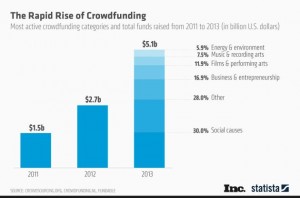Fake news isn’t going away.
We’re bombarded with the spurious and counterfeit on a daily basis, and this has made being regarded a reliable source of information tough to achieve. It also makes it an opportunity to stand out as a thought leader. For brands and marketers, this should always be the aspiration. You want people to read your blog, believe what you are saying, and regard you as dependable. You should always be looking to provide quality content that, ultimately, engenders trust.
Though establishing yourself as respectable and principled is not necessarily simple, striving to accomplish this goal is the best way to build an engaged audience. By cementing your position as a credible industry expert, people will be more likely to give you their time on a regular basis.
We all witnessed the term ‘fake news’ become as prominent during the American election campaign as any actual policies from either candidate, with Donald Trump in particular latching on to the phrase and using it to cast doubt upon the plentiful allegations and accusations aimed in his direction.
Provide quality content that, ultimately, engenders trust
The 71-year-old, who as we all know went on to win the presidential race, embraced social media and used it to not only to defend his image, but also as a means of going on the offensive.
Via his social media accounts, through which he could reach millions of people instantaneously, he tackled the media head-on. And his approach seems to have, to some extent, worked; he did become president, after all.
The real problem, of course, is that it’s so difficult to discern what’s true, and what isn’t. And even if you manage to establish that a particular quote or citation is honest, how do you then determine other factors, such as context?
Garner a reputation for being reliable and upright
This, of course, all extends to branded content as much as any other type, because trust in your content is your online currency. If your audience or customers do not trust you, there’s no point producing content in the first place. You need to seriously think about your marketing strategy and what it needs to achieve. If you’re in the boat of re-establishing trust, then damage control, rather than brand awareness, is your immediate issue.
Being regarded a reliable source of information tough to achieve
The bearers of news
The media’s job should, in a perfect world, be to report the issues of the day in a manner that is fair, reasonable and just. But, that is not, nor has it ever been, the way of the world. People, whether they realise it or not, demand opinion, and are happy to be led to conclusions. Again, the same is true for branded content. Indeed, in content marketing, this can be a good thing, because an opinion is unique content. It’s your view, and therefore can create value for your customers. But, of course, it’s crucial that they are able to trust what you say. If that trust isn’t there, you’ll have a hard job getting them on side, even if what you’re saying is exactly what they need to hear.
Slow and steady still wins the race
Social media has, essentially, given absolutely everyone the ability to break news. In the right place and at the right time, we can all end up playing the role of a journalist. The rise of the internet, but more specifically social media, means news spreads fast, and every newspaper and website wants to be on top of a trend as it emerges. Inevitably, prioritising speed over meticulousness can, and does, result in mistakes.
Fake news is not always malicious, nor is it necessarily a flagrant attempt at spreading unevidenced rumours. Unfortunately, however, with rapidity of publication now very much at the heart of media culture, with stories having the capacity to spread quickly, and due to the difficulty associated with authenticating and validating sources, the prominence of ‘fake’ news is unlikely to diminish in the immediate future.
If you are producing your brand’s content, this is something you will inevitably have to navigate. Do you take to social media immediately in a bid to boost your profile, or do you sit back and wait for the smoke to blow over? It could offer opportunities to shine as a thought leader in your industry if you’re not one to immediately jump.
Do you take to social media immediately in a bid to boost your profile?
It only takes one poorly judged move to tarnish your reputation, so whenever producing content, make sure everything can be backed up. It’s fine to have opinions, but make sure you are basing those opinions on figures, statistics and data that can support what you’re saying.
Is social media the answer?
Social media sites like Facebook and Twitter have no inherent agenda. Everyone is afforded the opportunity to post their opinions and views, and fellow users then have the ability to respond. Social media sites should be the great leveler, and on the surface they are. All messages are given the same opportunity to go viral, just as all users can – technically – reach a massive audience.
As a brand, do you actually want a level playing field?
Of course, this romantic view of social media is little more than an idealist’s fantasy; the reality is not quite so utopian.
As soon as the user begins to apply filters – who they follow, what search terms they use – neutrality is diminished. And, of course, not all views are treated equally; a verified political analyst, for example, is far more likely to be trusted than someone with no profile picture, few followers, and a fondness for profanity. This is as it should be, perhaps, but it also goes some way to highlighting the notion that social media does not provide a level playing field.
However, as a brand, do you actually want a level playing field? Wouldn’t you much rather have an advantage over your competitors? If you can turn social media to your advantage – cleverly piggybacking on trends, finding ways to go viral, pushing out genuinely valuable content – then you’ll be well placed to benefit. There is still an obligation to be honest and truthful, but that doesn’t mean you can’t be inventive.
Using common sense means favouring expert observations, but that doesn’t necessarily eradicate bias or impartiality. In fact, it could just as easily play into the hands of those with a motive; if experts speak well on a topic they appear to fully comprehend, why wouldn’t we accept what they say? If you can establish yourself as that expert, you will find it much easier to build a strong reputation.
With social media, the user is left contemplating the same age-old quandary; who can be relied upon to provide coverage that is reliable? Ensure that you are a source they can trust.
More haste, more speed
News now spreads almost instantly, but fully-formed and substantiated facts and details take time to emerge. Obtaining a comprehensive and entirely reliable report on a particular issue cannot be done without someone committing to detailed research, analysis and study. Unfortunately, by the time a clear picture of a major issue emerges, social media will already be awash with untruths, myths and misunderstandings. On social media, truth is habitually a secondary consideration.
Fully-formed and substantiated facts and details take time
However, this doesn’t mean you have to leave well alone. If you know something to be false, offer up the truth. Stand up for your opinions and fight your corner; let people know why something is false, but also why you can be trusted to provide the correct outlook. You should always be looking for ways to influence and attract positive attention, and this is just one of many ways to do that.
A chamber of echoes
Even the most discerning of social media users can fall into the trap of only associating with certain people, or certain topics, and therefore not being privy to every angle associated with a scenario. Fake news is not always the problem: sometimes, a failure to engage with certain sources can also skew someone’s perception to the point where one person’s truth is very different to someone else’s.
Looking for ways to influence
And this is more than just conjecture: research carried out by think-tank Demos found that users who identify as a supporter of a political party are far more likely share articles from publications that match their views, and are inclined to interact predominately with users of a similar mindset. However, this doesn’t just apply to politics.
Social media users tend to follow people or sources that support their own philosophies, so why not take advantage of that? If you genuinely think in a similar way about a certain topic, or have something to add to a discussion, you may be able to engage particular crowds that are receptive to what you are saying. This is just another way of understanding your audience, and knowing how to reach them effectively.
The rough with the smooth
Social media is, of course, a wonderful innovation. Giving people the ability to speak to their idols, and allowing news to spread quickly, means social media platforms have the capacity to be invaluable. The internet, likewise, is a magnificent tool. And, while they both offer individuals an almost endless supply of information, there’s nothing to say that all of that information will be factual. What you need to do is utilise these channels to not only get your name heard, but garner a reputation for being reliable and upright.
You are far more likely to succeed if all associations with your brand are positive. Just as you want to provide a positive customer experience and offer up the best quality goods, you also need to ensure your content marketing is up to scratch. By getting this mix correct from the outset, you’ll be setting down strong foundations upon which you can build as you move forward.
Business & Finance Articles on Business 2 Community
(21)






